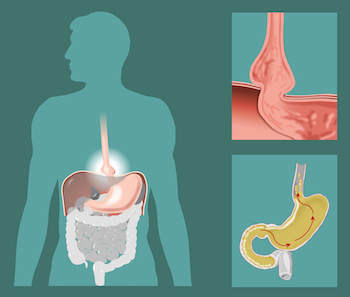Hiatal Hernia Repair Jacksonville
 A hiatal hernia is somewhat different from the abdominal hernias that we repair further down in the body. Hiatal hernias form as a result of expansion in the diameter of the hiatus –a hole in the diaphragm that allows the esophagus to pass through. These hernias are characterized by the top portion of the stomach, known as the fundus, pushing up through this newly enlarged defect.
A hiatal hernia is somewhat different from the abdominal hernias that we repair further down in the body. Hiatal hernias form as a result of expansion in the diameter of the hiatus –a hole in the diaphragm that allows the esophagus to pass through. These hernias are characterized by the top portion of the stomach, known as the fundus, pushing up through this newly enlarged defect.
There are two kinds of hiatal hernia. A sliding hiatal hernia is more common and involves both part of the stomach and the esophagus pushing upward through the hiatus. A paraesophageal hiatal hernia, however, occurs when part of the stomach pushes up next to the esophagus. The paraesophageal hernia increases the risk of strangulation of stomach tissue and requires a more immediate care in the form of a Nissen Fundoplication.
The most common risk factors for a hiatal hernia include:
- Obesity, lifting heavy weights, pregnancy or other strain on the abdomen that may put upward pressure on the diaphragm
- A congenitally enlarged hiatus
- Advanced age
Smaller hiatal hernias are typically asymptomatic, meaning they do not cause any outward symptoms. As a result, we do not screen for these hernias and they are usually found incidentally. The most common symptom of larger hernias, GERD, is not always easily attributable to a single condition, but we believe that a hiatal hernia may have something to do with it. Since most patients suffering from obesity also have a hiatal hernia, these hernias are often repaired during a primary bariatric procedure.
Treatment for Hiatal Hernias
Not all hiatal hernias need to be treated, but if the patient is undergoing a primary bariatric surgery or fundoplication procedure for GERD, a hiatal hernia is often detected and subsequently repaired during surgery. Only if a hiatal hernia is primarily responsible for a significant symptom, or if there is a significant risk of strangulation, do we perform primary surgery for this type of hernia.
Depending on the size of the hiatal hernia, it maybe sutured closed or may require hernia mesh like abdominal hernias. The surgical process is similar to other laparoscopic general surgery procedures. Minimally invasive devices are used to access the abdomen and perform surgery, shortening recovery time and reducing possible complications. Hospital stay and recovery time will be similar to the primary bariatric procedure or fundoplication performed.
Hiatal hernia repairs are typically very successful and almost always resolve bothersome symptoms.
